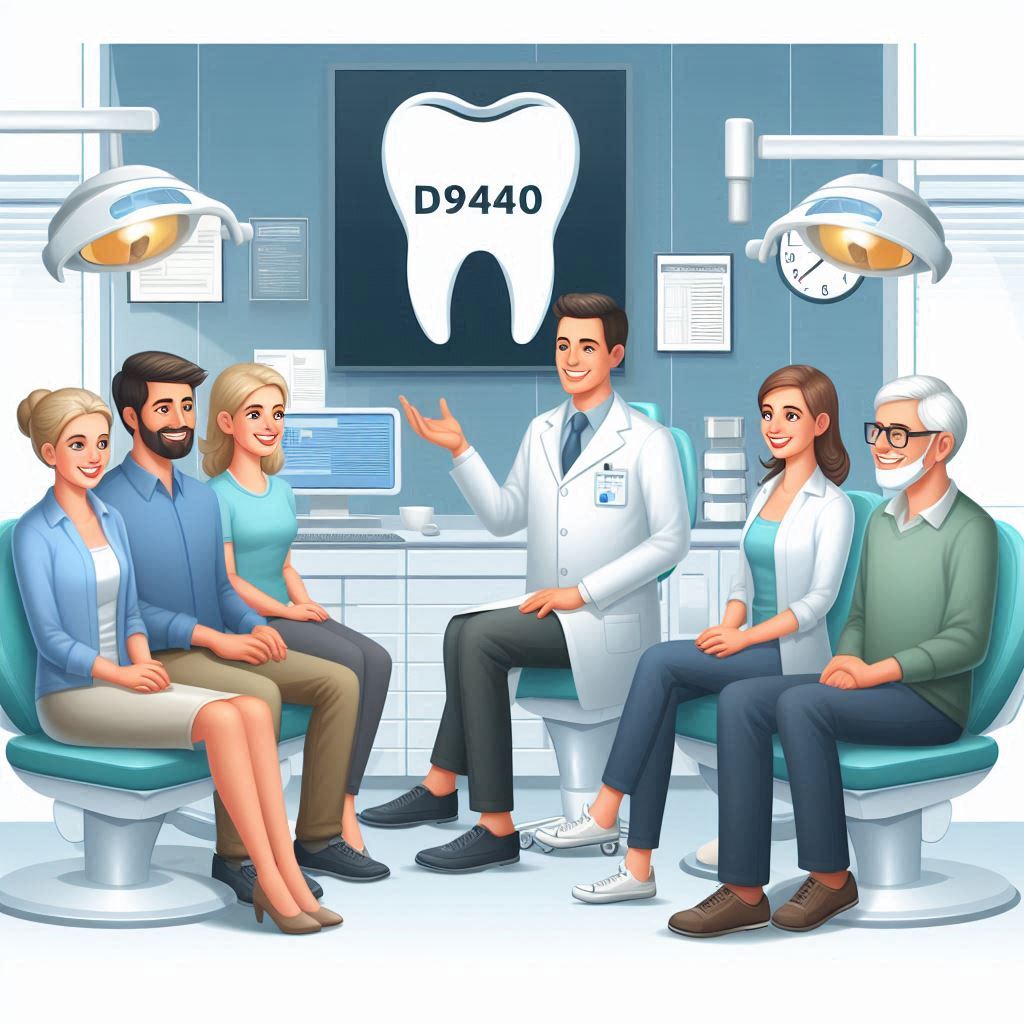D9440 Dental Code
The D9440 dental code is one of the most frequently used codes in dental offices, yet it remains one of the most misunderstood. Officially categorized under “Office Visit – After Regularly Scheduled Hours,” this code is essential for documenting and billing additional patient care outside normal operating hours.
Why is D9440 important?
- It ensures proper compensation for dentists providing emergency or extended care.
- It helps maintain accurate patient records for follow-up treatments.
- It plays a crucial role in insurance claims and reimbursement processes.
In this comprehensive guide, we will explore every aspect of the D9440 dental code, including its applications, billing nuances, and best practices for both dentists and patients.

2. What Does D9440 Entail?
The D9440 code is defined by the American Dental Association (ADA) as:
“Office visit after regularly scheduled hours – This code is used when a patient requires urgent or additional care outside of standard office hours.”
Key Features of D9440:
- After-Hours Care: Applies to visits scheduled outside normal business hours (evenings, weekends, holidays).
- Non-Emergency but Urgent Situations: Unlike emergency codes (D0140, D9110), D9440 is for non-life-threatening but time-sensitive cases.
- Documentation Required: Dentists must maintain detailed records justifying the after-hours service.
Example Scenarios for D9440 Usage:
✅ A patient calls with severe tooth pain at 8 PM, and the dentist opens the clinic for an evaluation.
✅ A follow-up adjustment for a dental prosthesis is needed on a weekend due to patient discomfort.
✅ A child’s orthodontic wire breaks, requiring an unscheduled visit on a holiday.
3. When Is D9440 Used in Dental Practice?
D9440 is not a catch-all code for all after-hours visits. It is specifically for non-emergency cases that still require prompt attention.
When to Use D9440 vs. Other Codes
| Scenario | Applicable Code |
|---|---|
| Routine check-up during office hours | D0120 (Periodic Oral Evaluation) |
| Dental emergency (severe pain, trauma) | D0140 (Limited Emergency Exam) |
| After-hours non-emergency visit | D9440 |
| Hospital emergency dental care | D9441 (Hospital Call) |
Misuse of D9440 can lead to:
❌ Insurance claim denials
❌ Audits and compliance issues
❌ Patient confusion over billing
4. Key Differences Between D9440 and Other Dental Codes
Many dental codes overlap in function, but D9440 has distinct characteristics:
D9440 vs. D9110 (Emergency Treatment)
- D9110 = Immediate care for acute conditions (e.g., abscess, knocked-out tooth).
- D9440 = Scheduled but urgent care outside business hours (e.g., denture adjustment, mild pain).
D9440 vs. D0140 (Limited Emergency Exam)
- D0140 = A focused exam for sudden emergencies.
- D9440 = A full visit requiring additional time outside normal hours.
5. Billing and Insurance Considerations for D9440
Insurance Coverage for D9440
- Most PPO plans cover D9440, but reimbursement varies.
- Medicaid & HMOs may require pre-authorization.
- Out-of-pocket costs typically range from 75to75to200 per visit.
Tips for Accurate Billing:
✔ Verify insurance eligibility before scheduling after-hours visits.
✔ Document necessity (e.g., “Patient unable to wait due to work schedule”).
✔ Use modifiers (if applicable) like -ET (Emergency Treatment) for clarity.
6. Common Misconceptions About D9440
❌ Myth: “D9440 is only for extreme emergencies.”
✅ Fact: It’s for urgent but non-life-threatening cases.
❌ Myth: “Patients can’t be charged if it’s after hours.”
✅ Fact: Dentists can bill fairly for extended availability.
7. Best Practices for Dentists When Using D9440
- Train staff on proper documentation.
- Set clear after-hours policies (e.g., extra fees, appointment limits).
- Use digital scheduling tools to track after-hours visits efficiently.
8. Patient Perspective: What to Expect During a D9440 Visit
Patients should:
✔ Confirm insurance coverage beforehand.
✔ Understand potential additional fees.
✔ Bring relevant medical/dental history for faster treatment.
9. Legal and Ethical Considerations
- ADA guidelines must be followed to avoid fraud allegations.
- Transparency with patients about fees is critical.
10. Future Trends in Dental Coding and D9440
- AI-driven coding assistants may reduce errors.
- Tele-dentistry expansions could influence after-hours billing.
11. Conclusion
The D9440 dental code is essential for after-hours dental care, balancing patient needs with fair compensation for dentists. Proper documentation, insurance awareness, and ethical billing ensure smooth operations. As dental practices evolve, understanding D9440 will remain crucial for both providers and patients.
12. Frequently Asked Questions (FAQs)
Q1: Can D9440 be used for a regular check-up after hours?
No, it’s only for urgent but non-emergency visits.
Q2: Does Medicaid cover D9440?
Sometimes, but pre-authorization is often required.
Q3: How much does an after-hours visit cost?
Typically between 75−75−200, depending on the practice.


